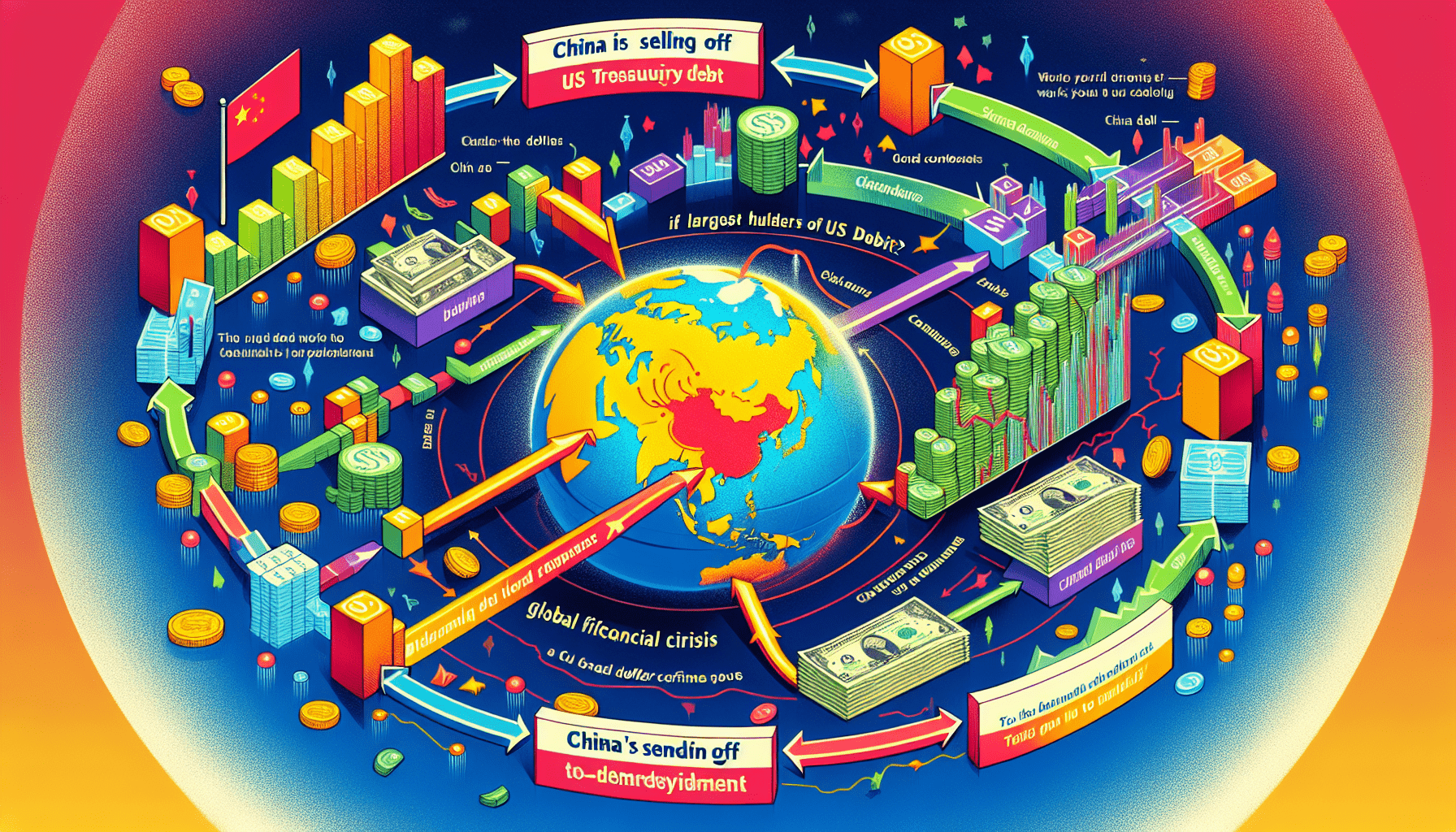In the ever-evolving landscape of global economics, one question that has often been asked is whether China possesses the power to call in the massive amount of US debt it holds. With China holding a significant portion of US Treasury securities, the idea of them demanding repayment and potentially causing a financial catastrophe has become a topic of concern and speculation. In this article, we will explore the possibility of China “calling in” US debt, examining the potential consequences and discussing the various factors that come into play.
Understanding US Debt and China’s Position
Explanation of what US debt is
US debt refers to the total amount of money owed by the United States government to various creditors, including individuals, institutions, and foreign countries. It is the result of the government’s fiscal deficit, which occurs when its expenditures exceed its revenues. When the government needs additional funds to cover its expenses, it borrows money by issuing Treasury securities in the form of Treasury bills, notes, and bonds. These instruments represent the government’s promise to repay the borrowed amount along with interest at a predetermined future date.
China’s role in the US debt
China is one of the largest foreign holders of US debt. Over the years, it has accumulated a significant amount of Treasury securities, making it a major creditor to the United States. This substantial holding of US debt has given China a unique position in the global economy and has both economic and political implications for both countries.
The relation between US debt and China’s economy
The accumulation of US debt by China has created a complex interdependence between the two economies. China’s purchase of Treasury securities has helped finance the US government’s budget deficit, effectively enabling the United States to continue its spending patterns. On the other hand, this has also resulted in China’s economy becoming heavily dependent on the stability and strength of the US economy. Any unforeseen shocks or instability in the US economy can have serious consequences for China’s economic growth and stability.
The Concept of Calling in Debt
Understanding the meaning of calling in debt
Calling in debt refers to the action of a creditor demanding repayment of the outstanding debt in its entirety, often before the scheduled maturity date. In the case of China and the US debt, it would mean China demanding the United States to repay the entire amount of debt it holds. It is worth noting that calling in debt does not necessarily mean that the debtor needs to repay the full amount immediately, but rather signifies a change in the terms or conditions of the debt agreement.
Factors that determine a country’s ability to call in its debt
The ability of a creditor country like China to call in its debt is influenced by several factors. These include the creditor’s economic strength, the debtor’s ability to repay, the geopolitical consequences of such actions, and the existing agreement between the two parties. It is crucial to consider these factors before making any decision regarding the calling in of debt, as it can have wide-ranging implications for both the debtor and the creditor.
The practicality of China calling in US debt
Calling in the US debt held by China is not a straightforward process. The sheer size of the debt, which is estimated to be over a trillion dollars, makes it practically impossible for China to demand immediate repayment. The US government would need to find alternative sources of funding to repay such a massive debt in a short timeframe. Consequently, in reality, calling in the debt would likely involve a renegotiation of terms or a gradual reduction in China’s holdings rather than a sudden demand for full repayment.

Nature of US Debt Held by China
Understanding what form the US debt held by China takes
The US debt held by China is primarily in the form of Treasury securities. These securities are issued by the US Department of the Treasury and are regarded as low-risk investments. China holds a substantial portion of these securities and invests in a mix of short-term Treasury bills, medium-term notes, and long-term bonds. This diverse portfolio allows China to manage risks and optimize its returns on investment.
The agreement between the US and China regarding the debt
The specific details of the agreement between the US and China regarding the debt are not publicly disclosed. However, it is widely understood that China and the US have a mutually beneficial relationship. China invests in US debt as a means of diversifying its foreign exchange reserves and ensuring the stability of its currency, the renminbi. Meanwhile, the US government relies on China’s purchases to finance its budget deficit and maintain favorable borrowing rates.
Potential Consequences of China Calling In US Debt
Impact on the US economy and dollar value
If China were to call in a significant portion of its US debt holdings, it could potentially have a profound impact on the US economy and the value of the US dollar. Such an action might lead to a decrease in demand for US Treasury securities, causing their prices to fall and their yields to rise. This would result in higher borrowing costs for the US government, increased interest rates for businesses and consumers, and potentially slower economic growth. Furthermore, a significant reduction in China’s holdings could weaken faith in the stability of the US dollar as the global reserve currency.
Global economic consequences
The global economic consequences of China calling in US debt would be far-reaching. The US dollar is the dominant currency in international trade and finance, and any disruptions in its stability can have significant ripple effects across the global economy. Such a move by China could trigger financial market volatility, undermine investor confidence, and lead to a realignment of global economic power. It could also result in increased borrowing costs for other countries, particularly those with high levels of US dollar-denominated debt.
Impact on China’s economy
While calling in US debt may have repercussions on the US economy, it could also have adverse effects on China’s economy. China’s massive holdings of US debt are an integral part of its foreign exchange reserves, providing stability and enabling the government to manage currency fluctuations. A sudden reduction in these holdings or a loss of confidence in the US dollar could disrupt China’s monetary policy, impact its currency exchange rates, and potentially weaken its economic growth.

China’s Ability to Sell US Debt
Feasibility of China selling off US debt
Although technically feasible, selling off a substantial amount of US debt is not without challenges. Not only would such a move flood the market with Treasury securities, potentially causing their prices to plummet, but it would also raise concerns about China’s motivations and intentions. Selling off a significant portion of its US debt holdings could be interpreted as a signal of strained US-China relations, damaging China’s reputation and potential future access to international financial markets.
Potential buyers of the US debt
In the event of China selling off its US debt, potential buyers would likely include other countries, institutional investors, and private investors seeking safe and liquid assets. Countries with large foreign exchange reserves, such as Japan and Germany, could be interested in expanding their Treasury holdings. Furthermore, institutional investors and private investors looking for stable investments could find US debt attractive, despite potential short-term fluctuations in prices.
Economic implications of selling the debt
Selling off US debt holdings would have economic implications for both China and the wider global market. The increased supply of Treasury securities could lead to a decrease in their prices, driving up yields and interest rates. This could result in higher borrowing costs for the US government, other countries, and businesses, potentially dampening economic activity. Additionally, the sudden sale of large amounts of US debt by China may also trigger market volatility and potentially disrupt financial stability.
Historical Instances of Debt Call-in
Past occurrences of countries calling in debts
Throughout history, there have been instances of countries calling in debts owed to them. One noteworthy example is the United States’ decision to call in debts owed by European countries after World War I. Additionally, during the Latin American debt crisis in the 1980s, creditors such as the International Monetary Fund (IMF) played a significant role in negotiating debt restructuring and repayment arrangements.
Consequences of these historical instances
The consequences of historical instances of debt call-in varied depending on the specific circumstances. In some cases, debt call-in led to severe economic and political crises, causing widespread defaults, currency devaluations, and social unrest. In other instances, negotiations and debt restructuring agreements were reached, allowing for more manageable repayment terms and avoiding the worst-case scenarios.
Relevance to China calling in US debt
While past instances of debt call-in provide insights into the potential outcomes, each situation is unique. China’s position as a major US debt holder and its relationship with the United States make the potential call-in of US debt particularly complex. The interconnectedness of the global economy, the importance of US-China relations, and the scale of the debt involved all contribute to the relevance of understanding historical cases while evaluating the implications of a potential debt call-in by China.

Role of International Institutions in US Debt
Function of institutions like the IMF in managing US debt
International institutions such as the IMF play an important role in managing and monitoring global debt issues, including US debt. The IMF serves as a forum for cooperation and coordination among member countries, providing financial assistance and policy advice when countries face significant economic challenges. While the IMF’s involvement in managing US debt is indirect, it actively works to promote global financial stability and prevent or manage potential debt crises.
Tools these institutions have to prevent or manage a debt crisis
To prevent or manage a debt crisis, institutions like the IMF have various tools at their disposal. These include providing financial assistance to countries in need, facilitating debt restructuring agreements, promoting dialogue between debtors and creditors, and advocating for sound fiscal policies. The resources and expertise of such institutions are crucial in preventing disorderly debt situations and mitigating the negative consequences that can stem from them.
Attitude of international institutions towards China calling in US debt
International institutions would likely view a potential call-in of US debt by China as a significant development with possible systemic implications. They would closely monitor the situation and engage in discussions with both China and the United States to mitigate any negative impacts. The focus would be on ensuring financial stability, facilitating dialogue between the parties involved, and working towards a mutually beneficial resolution that maintains confidence in the global financial system.
Political Ramifications of Debt Call-in
Potential impact on US-China relations
A debt call-in by China would undoubtedly have political ramifications on US-China relations. Such an action could be perceived as a hostile move, straining diplomatic ties and exacerbating existing tensions between the two countries. It may also lead to retaliatory measures from the United States, such as imposing trade restrictions or sanctions, further escalating the situation and increasing the likelihood of a broader economic and geopolitical conflict.
How other countries may respond to such a move
The response of other countries to China calling in US debt would vary depending on their respective interests and relationships. Some countries may view it as an opportunity to expand their influence or capitalize on the resulting market turbulence. Others may be concerned about the potential contagion effect on their own economies and seek to mitigate the risks. Overall, the response from other countries would likely be influenced by their economic ties, geopolitical considerations, and broader alliances.
The influence of international politics on economic decisions
International politics often intertwine with economic decisions, particularly in cases of debt call-in. Geopolitical considerations, national security concerns, and diplomatic relations all shape the decision-making process. Policy choices related to debt call-in involve careful calibration of economic interests, maintaining credibility, and assessing the potential consequences on both domestic and international fronts. As such, economic decisions are rarely made in isolation and are influenced by a variety of political factors.

Expert Opinions on China Calling in US Debt
Economic forecasts and predictions from experts
Expert opinions on the likelihood and implications of China calling in US debt vary. Some economists believe that the potential risks associated with such a move outweigh the benefits for China, making it unlikely in the near term. Others argue that geopolitical tensions and changing global dynamics could drive China to consider leveraging its substantial holdings of US debt as a means of exerting influence or achieving strategic goals. Overall, forecasting the actions of economic actors in complex scenarios such as these remains challenging and speculative.
Views on the likelihood and implications of China calling in US debt
Analysts and experts continue to debate the likelihood and implications of China calling in US debt. While some argue that China has a strong incentive to maintain stability, others contend that shifts in global power dynamics and any deterioration in US-China relations could compel China to exercise its economic leverage. The implications of such a move would be far-reaching, affecting not only the two countries involved but also the broader global economy and financial markets.
Alternatives to Calling in the Debt
Other options available to China regarding US debt
Instead of calling in its US debt holdings, China has various alternatives at its disposal. It could choose to gradually reduce its holdings through market transactions, diversify its currency reserves into other assets, or negotiate with the United States for favorable terms. By adopting a more measured and strategic approach, China can minimize potential disruptions while still safeguarding its own economic interests.
How these alternatives may impact both China and the US
Exploring alternatives to calling in US debt can have different impacts on China and the United States. Gradually reducing holdings through market transactions could potentially help mitigate potential market volatility and limit adverse consequences. Diversifying currency reserves into other assets may provide China with enhanced risk management capabilities and potentially reduce its dependence on the stability of the US dollar. Negotiating for favorable terms could contribute to maintaining stable US-China relations while addressing China’s concerns regarding the long-term value of its investments.
As China’s position as a major US debt holder continues to evolve, it is important to closely monitor developments in US-China relations, the macroeconomic environment, and shifting global dynamics. The potential call-in of US debt by China remains a topic of interest, speculation, and analysis for policymakers, economists, and market participants alike. By understanding the complexities involved, evaluating historical precedents, and considering expert opinions, a comprehensive assessment can be made regarding the potential outcomes and implications of such a significant economic event.

